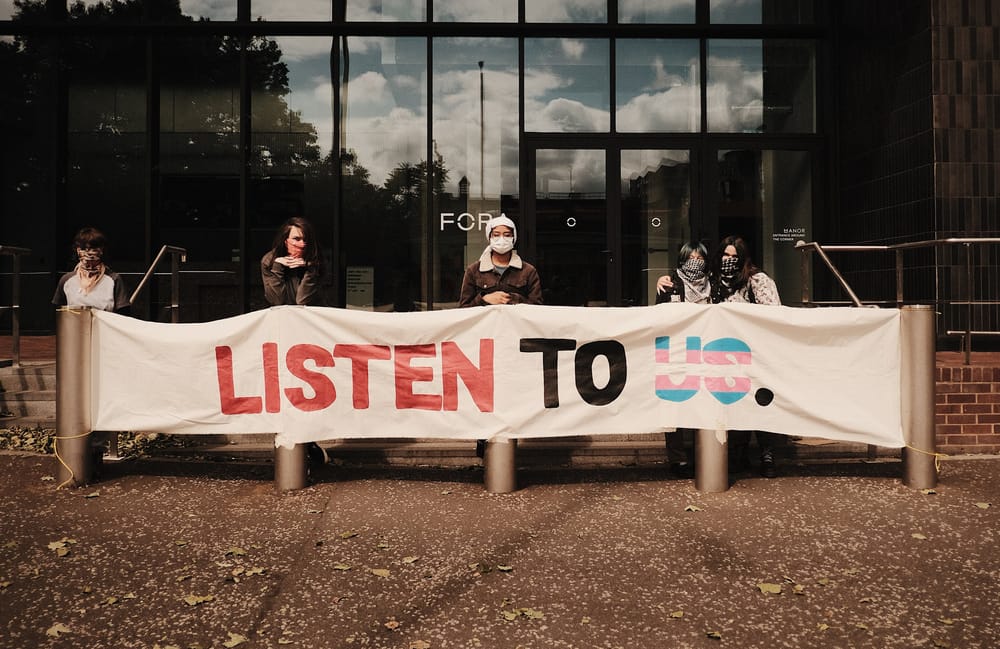Left populism doesn't create antisemitism - it's our best hope of fighting it
Jews cannot be told that Corbyn’s programme is incompatible with the fight against antisemitism.

Last September, the longstanding and outspoken editor of the Jewish Chronicle, Stephen Pollard, got himself into some trouble on Twitter. Pollard had retweeted a video Jeremy Corbyn made to mark the tenth anniversary of the financial crash. In it, the Labour leader provided an uncontroversial, if unabashedly left-wing, account of Britain’s recent economic history: while the banks caused the crash, said Corbyn, ordinary taxpayers had been forced to pay for it. Subsequently, the Conservative Party inflicted austerity on the country, producing a decade of low growth and decimating public services, while allowing the banks to continue to profit. “Ten years ago today the financial crash began,” Corbyn captioned his video. “The people who caused it now call me a threat. They’re right: Labour is a threat to a damaging and failed system rigged for the few.”
“Been hesitating to tweet this,” wrote Pollard, “bevause [sic] I keep thinking that it can’t be, surely it can’t be. But the more I think about it, the more it seems it really is. This is ‘nudge, nudge, you know who I’m talking about don’t you?’ And yes I do. It’s appalling.” Pollard’s implication, of course, was that by “people”, Corbyn meant “Jews”. This claim was quickly met with a barrage of criticism, prompting an uncharacteristic semi-retraction: “I accept all the criticism of this tweet,” Pollard tweeted later that day, “and that I may be way off beam. But this is what happens when antisemitism is allowed to flourish – and when an anti-Semite leads a party. You start to read his every word through that prism. Even if the words aren’t about Jews.”
Of course, an antisemitic archetype of over-powerful Jewish bankers persists in popular culture. It is nonetheless curious that Pollard should have read antisemitic intent into Corbyn’s language, given he said it would be “bizarre” to characterise as antisemitic Jacob Rees-Mogg’s reference to George Soros as the “Remoaner funder-in-chief”. Then again, this inconsistency is unsurprising: in a 2006 blog about Middle Eastern terrorism, Pollard wrote that “The Left, in any recognisable form, is now the enemy” in “the battle to preserve Western civilisation and freedom”—and, more recently, in the battle against antisemitism, he latterly appears to believe.
The claim that antisemitism is endemic in, even inherent to, the contemporary left is made not only by neocons like Pollard. Earlier this year, Guardian columnist Jonathan Freedland bemoaned the rise in “populism” on both the right and the left, yet associated antisemitism specifically with left-wing populism. “Huge chunks of the egregious anti-Jewish racism spewed out in left circles and on social media has nothing to do with Israel or Palestine”, he wrote, “it’s all bankers and Rothschilds”. Freedland attributed the growth in such attitudes to Corbyn, claiming the Labour leader promotes a worldview conducive to conspiratorial thinking. “Corbynism’s big move”, he wrote, “is away from seeing capitalism as a system with its own unalterable dynamics […] to seeing its cruelties instead as the work of malign individuals”. In Freedland’s opinion, it’s a small leap from condemning financier fat-cats to seeing sinister Jewish influence everywhere.
Freedland’s argument hinges on a mistaken distinction between structural (good) and populist (bad) left-wing politics, between “seeing capitalism as a system” and “as the work of malign individuals”. Freedland thus paints populism as a type of politics, when it is better understood as a style of it, a strategy of targeting a common enemy in order to construct a collective political identity—what the late Argentinian political theorist Ernesto Laclau called a “chain of equivalence”—between diverse groups. When Corbyn names “dodgy landlords”, “bad bosses” and “tax evaders”, it is not because he genuinely believes Britain’s problems are the result of individual bad actors; it is because these bad actors helpfully embody structural problems in a way that makes it easier to rally popular support. If Corbyn campaigned on a platform of combating capitalist ownership of the means of production, he would unlikely be elected to do so.
Populism is thus a form not of ideology but of discourse, and as such can be mobilised in the service of substantively different political projects, including those that are far from “radical”: Tony Blair often used the supposedly Corbynite slogan “For the many, not the few”; George Osborne never missed an opportunity to pit parasitical “skivers” against honest “strivers”; the Lib Dems called for a “people’s vote” and now seek to overturn a referendum result they claim was stolen by corrupt elites. The difference is that these populisms are attached to political projects that seek to maintain the socioeconomic status quo. Corbyn’s, by contrast, hopes to mobilise voters behind radical changes to our society and economy. If something has changed in recent years, it is not the appearance of populism where it didn’t previously exist. It is that, in a context of persistent economic and political crisis, bolder forms of populist discourse gesturing towards genuinely transformative political projects have gained resonance.
In blaming Corbyn for the rise in left-wing antisemitism, Freedland ironically takes a populist view of the problem, which he attributes to a “malign individual”, rather than broader social conditions. There is a more convincing explanation: that the same crises that have made populist discourse more appealing—austerity, inequality and precarity, as well as the enhanced role of social media in political life—have made antisemitism more appealing, too. To say that there are individuals who are drawn to both leftist politics and antisemitism is not to say that the former causes the latter.
The fact that antisemitism is not inherent to the contemporary left does not mean inherently “anti-racist”, either. Yet to effectively fight antisemitism on the left, we must first correctly identify its source. As Keith Kahn-Harris notes in his recent book, there are historical factors that have estranged the left from British Jews, in particular the Israel-Palestine conflict and the community’s upward social mobility. As a result, many on the left—without engaging in antisemitism themselves—no longer view Jews as a vulnerable minority. Their senses have therefore been dulled to antisemitism, particularly its subtler manifestations. This has in turn created a permissive environment for the small minority who express antisemitic attitudes, a culture problem reflected in institutional inertia. While this is an issue in its own right, it is not the issue of systematic antisemitism by a left-populist demagogue claimed by Freedland.
If Labour can address its internal problems—and it has taken promising steps towards doing so—it has the potential to play a pivotal role in challenging antisemitism across society. Indeed, Labour is the only national party with a policy agenda capable of addressing the major social and economic challenges that have revived an historical hatred of Jews. Many British Jews have waited a long time to vote out the “business as usual” cruelty of Tory government; to vote in a party that will protect our public services, reduce inequality and confront the climate crisis. Jews cannot be told that Corbyn’s programme is incompatible with the fight against antisemitism. On the contrary: it is our best hope of winning it. ▼
Matthew Aaron Richmond is a geographer, sociologist and Latin Americanist. He is currently a Postdoctoral Researcher at the State University of São Paulo and Visiting Fellow at the London School of Economics. He has written for Jacobin and Open Democracy, and also tweets and blogs.
Author
Matthew Aaron Richmond is a geographer, sociologist and Latin Americanist. He is a Postdoctoral Researcher at the State University of São Paulo and Visiting Fellow at the London School of Economics.
Sign up for The Pickle and New, From Vashti.
Stay up to date with Vashti.



